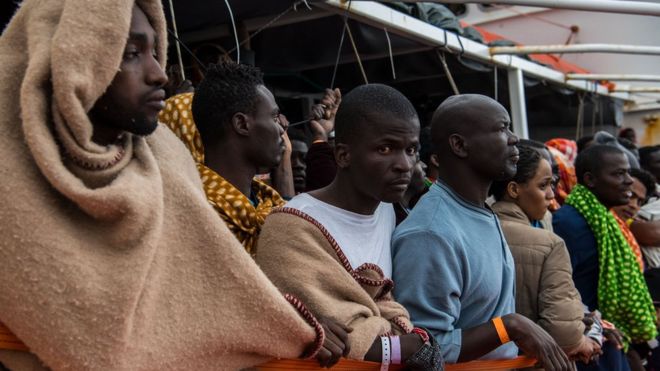Eastern Libya has banned men and women between the ages of 18 and 45 from travelling abroad without permission.
The region’s military chief of staff, Abdelrazzak Al-Naduri, said the aim of the move was to prevent people from joining terrorist groups abroad.
Libya has rival administrations in the east and west, and much of the country is effectively controlled by militias.
The new order comes days after a controversial ban on women’s travel was introduced, and quickly suspended.
That order, also issued by the authorities in eastern Libya, prevented women under 60 from travelling without a male companion.
Libyans in other parts of the country are unlikely to be affected by the new ban, because the two rival centres of power do not recognise each other’s authority.
The new order means eastern Libya’s military intelligence and ministry of interior will be responsible for issuing permits for those who wish to travel.
A source at the military chief of staff’s office told the BBC the order was likely to be a temporary one, and that most travellers would be able to obtain a security clearance within a day.
But he did not specify what the criteria for a travel permit would be.
The short-lived ban on women’s travel was also introduced for national security reasons, the military said.
It claimed that some women were communicating with foreign intelligence services.
However, that directive was widely condemned and ridiculed by Libyans, the BBC’s North Africa correspondent Rana Jawad reports.
The country has been torn by strife since the toppling of Muammar Gaddafi in 2011.
Eastern Libya is under the control of strongman commander Khalifa Hafter, who is leading the battle against Islamist militias. Its government is not recognised by the international community.
The rival government is based in the capital, Tripoli.
The power vacuum created after Gaddafi’s fall allowed the Islamic State group to gain a foothold in the country, adding to an already volatile situation.
An estimated 400,000 Libyans have also been internally displaced during the conflict.
The situation has led to a flood of migrants attempting to travel to Italy by boat, often with fatal consequences.
Source: BBC


